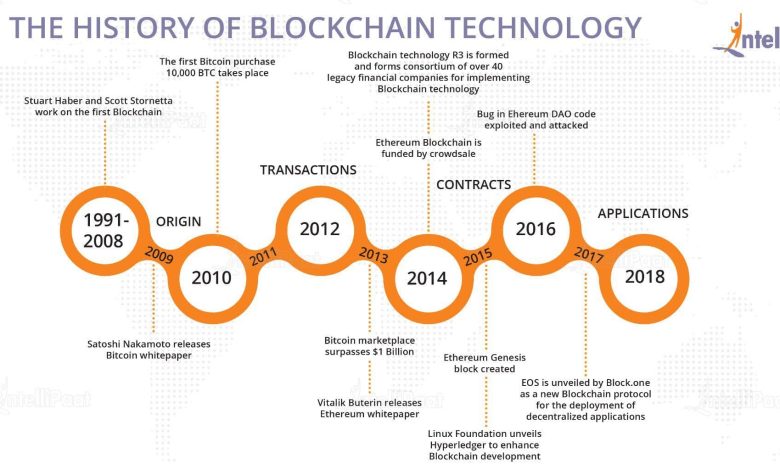The Evolution of Blockchain Technology

- Understanding the Basics of Blockchain Technology
- The Rise of Cryptocurrencies and Blockchain
- Exploring the Impact of Blockchain on Various Industries
- The Future of Blockchain Technology: Trends and Predictions
- Challenges and Opportunities in the World of Blockchain
- How Blockchain is Revolutionizing the Financial Sector
Understanding the Basics of Blockchain Technology
Blockchain technology is a decentralized, distributed ledger system that securely records transactions across a network of computers. This technology is the foundation of cryptocurrencies like Bitcoin, but its applications extend far beyond digital currencies. Understanding the basics of blockchain technology is essential for grasping its potential impact on various industries.
One key feature of blockchain technology is its ability to create a tamper-proof record of transactions. Each block in the chain contains a list of transactions, along with a unique cryptographic hash that links it to the previous block. This creates a secure and transparent record that is resistant to manipulation.
Another important aspect of blockchain technology is its decentralized nature. Instead of relying on a central authority to validate transactions, blockchain networks use consensus algorithms to verify the integrity of the data. This eliminates the need for intermediaries and reduces the risk of fraud or censorship.
Blockchain technology also offers increased transparency and traceability. Since all transactions are recorded on the blockchain, users can track the history of an asset from its creation to its current owner. This can be particularly useful in supply chain management, where it can help prevent fraud and ensure the authenticity of products.
Overall, blockchain technology has the potential to revolutionize industries ranging from finance to healthcare to logistics. By understanding the basics of blockchain technology, businesses and individuals can harness its power to create more secure, efficient, and transparent systems.
The Rise of Cryptocurrencies and Blockchain
The rise of cryptocurrencies and blockchain technology has been a significant development in the world of finance and technology. Cryptocurrencies, such as Bitcoin and Ethereum, have gained popularity as digital assets that offer decentralized and secure transactions. Blockchain, the underlying technology behind cryptocurrencies, is a distributed ledger that records transactions across a network of computers.
One of the key features of blockchain technology is its transparency and immutability. Transactions recorded on a blockchain are secure and cannot be altered once they are confirmed. This has led to increased trust in the technology and its applications in various industries beyond finance, such as supply chain management, healthcare, and voting systems.
The decentralized nature of blockchain technology means that there is no central authority controlling the network. This has implications for traditional financial institutions and governments, as it challenges the existing systems of governance and control. As a result, there has been a growing interest in exploring the potential of blockchain technology to disrupt and revolutionize various sectors.
The adoption of cryptocurrencies and blockchain technology has also led to the emergence of new business models and opportunities. Initial Coin Offerings (ICOs) have become a popular way for startups to raise funds by issuing digital tokens on a blockchain. Smart contracts, self-executing contracts with the terms of the agreement directly written into code, have also enabled new ways of automating and enforcing agreements.
Overall, the rise of cryptocurrencies and blockchain technology represents a shift towards a more decentralized and transparent future. As the technology continues to evolve and mature, it is likely to have a profound impact on how we transact, communicate, and interact with each other in the digital age.
Exploring the Impact of Blockchain on Various Industries
Blockchain technology has been making waves across various industries, revolutionizing the way businesses operate and interact with customers. Its decentralized and secure nature has the potential to transform traditional processes and increase efficiency. Let’s explore how blockchain is impacting different sectors:
- Finance: In the financial sector, blockchain is disrupting the way transactions are conducted. It provides a transparent and immutable ledger that reduces the risk of fraud and streamlines processes such as cross-border payments and smart contracts.
- Healthcare: Blockchain is revolutionizing healthcare by securely storing patient data, ensuring privacy, and enabling interoperability between different healthcare providers. This technology has the potential to improve patient outcomes and reduce administrative costs.
- Supply Chain Management: Blockchain is enhancing transparency and traceability in supply chains by providing a secure and decentralized ledger to track the movement of goods. This helps in reducing fraud, counterfeiting, and improving overall efficiency.
- Real Estate: In the real estate industry, blockchain is simplifying property transactions by enabling secure and transparent record-keeping. Smart contracts on blockchain platforms automate processes such as property transfers, reducing the need for intermediaries.
- Education: Blockchain is transforming the education sector by providing secure and tamper-proof credentials. This technology enables the verification of academic qualifications and certifications, making the hiring process more efficient and reliable.
Overall, blockchain technology is reshaping various industries by increasing transparency, security, and efficiency. As businesses continue to explore the potential of blockchain, we can expect further innovations and disruptions in the way we conduct transactions and manage data.
The Future of Blockchain Technology: Trends and Predictions
The future of blockchain technology holds immense potential for transforming various industries and revolutionizing the way we conduct transactions and store data. As we look ahead, several trends and predictions are emerging that will shape the evolution of blockchain technology in the coming years.
- Increased adoption in mainstream industries: One of the key trends we can expect to see is the increased adoption of blockchain technology in mainstream industries such as finance, healthcare, supply chain, and real estate. This widespread adoption will lead to greater efficiency, transparency, and security in various processes.
- Integration with other technologies: Blockchain is likely to be integrated with other emerging technologies such as artificial intelligence, Internet of Things, and big data analytics. This integration will create new opportunities for innovation and enhance the capabilities of blockchain applications.
- Focus on scalability and interoperability: Scalability and interoperability have been major challenges for blockchain technology. In the future, we can expect to see advancements in protocols and solutions that address these challenges, making blockchain more scalable and interoperable across different platforms.
- Regulatory developments: As blockchain technology continues to gain traction, regulatory frameworks are expected to evolve to provide clarity and guidance for businesses and users. Regulatory developments will play a crucial role in shaping the future of blockchain technology and ensuring its widespread adoption.
- Rise of decentralized finance (DeFi): Decentralized finance, or DeFi, is a rapidly growing sector within the blockchain industry. DeFi platforms offer a wide range of financial services without the need for traditional intermediaries. The rise of DeFi is expected to continue, providing new opportunities for financial inclusion and innovation.
Overall, the future of blockchain technology is bright, with numerous opportunities for growth and innovation. By staying informed about the latest trends and developments in the blockchain space, businesses and individuals can position themselves to take advantage of the transformative potential of this groundbreaking technology.
Challenges and Opportunities in the World of Blockchain
The world of blockchain presents a myriad of challenges and opportunities for businesses and individuals alike. As this technology continues to evolve, it is crucial to stay informed about the latest trends and developments in order to capitalize on its potential.
One of the main challenges in the world of blockchain is scalability. As more transactions are processed on the blockchain, the network can become congested, leading to slower transaction times and higher fees. However, there are ongoing efforts to address this issue through the development of new protocols and technologies.
Another challenge is regulatory uncertainty. Governments around the world are still grappling with how to regulate blockchain technology, which can create a sense of instability for businesses operating in this space. It is important for companies to stay abreast of the latest regulatory developments and ensure compliance with any new laws or guidelines.
Despite these challenges, there are also numerous opportunities in the world of blockchain. For example, blockchain technology has the potential to revolutionize industries such as finance, supply chain management, and healthcare. By leveraging blockchain solutions, businesses can streamline operations, reduce costs, and improve transparency.
Moreover, blockchain offers the opportunity to create new business models and revenue streams. Smart contracts, for instance, enable automated and self-executing agreements, which can help businesses save time and resources. Additionally, blockchain can facilitate the tokenization of assets, allowing for greater liquidity and accessibility in the financial markets.
How Blockchain is Revolutionizing the Financial Sector
Blockchain technology is transforming the financial sector by providing a secure and transparent way to record transactions. This decentralized system eliminates the need for intermediaries, reducing costs and increasing efficiency. Financial institutions are increasingly adopting blockchain to streamline processes such as cross-border payments, trade finance, and asset management.
One of the key benefits of blockchain in finance is its ability to enhance security. The technology uses cryptographic algorithms to secure transactions, making it nearly impossible for hackers to manipulate the data. This increased security is crucial in an industry where sensitive financial information is constantly at risk.
Another advantage of blockchain in finance is its transparency. All transactions are recorded on a shared ledger that is accessible to all parties involved. This transparency helps to prevent fraud and ensures that all transactions are legitimate. Additionally, the immutability of blockchain ensures that once a transaction is recorded, it cannot be altered or deleted.
Blockchain technology also offers increased speed and efficiency in financial transactions. Traditional banking processes can be slow and cumbersome, especially for cross-border transactions. With blockchain, transactions can be completed in a matter of seconds, regardless of the location of the parties involved. This speed and efficiency are revolutionizing the way financial institutions operate.
Overall, blockchain technology is revolutionizing the financial sector by providing increased security, transparency, and efficiency. As more institutions adopt this technology, we can expect to see even greater advancements in the way financial transactions are conducted. The future of finance is undoubtedly blockchain-driven.






